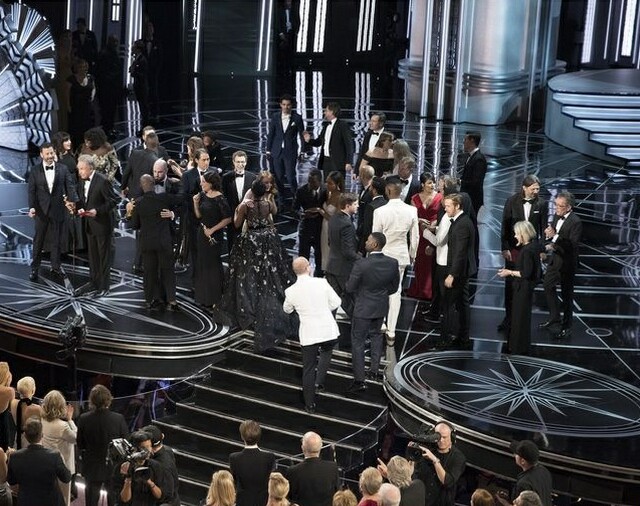Oscar Snafu: TV's Latest Historic Moment

The Brexit vote, the World Series, the 2016 President Election, the Super Bowl and now the Oscars -- the era of unlikely endings prevailed Sunday night at the Academy Awards when presumed Best Picture winner La La Land won and then lost the award to Moonlight.
There is no greater harbinger for this age than the scene that played out Sunday night. By no real fault of their own, old-school screen legends Faye Dunaway and Warren Beatty incorrectly presented the Oscar to old-school, sentimental movie musical La La Land, only for the award to be redistributed to actual winner Moonlight -- a gritty coming of age tale featuring a largely African-American cast.
For what it's worth, I had been pulling for La La Land. Some critics (and most of my friends) cited director Damien Chazelle's colorful ode to Old Hollywood as weak and lacking in substance during an emotionally fraught year. But I would argue that there was a deeper message behind La La Land and that we ought to celebrate music and imagination during these trying times. True, Ryan Gosling and Emma Stone cannot sing, but I think that's partially the point -- they play average characters aiming for the extraordinary. What happens when our dreams outweigh our talent?
Also, La La Land did not feature the traditional happy Hollywood ending that a lesser movie might have.
But the Hollywood ending I'm really here to talk about is the one that took place at the Oscars when Beatty and Dunaway, on hand to celebrate the 50th anniversary of their classic Bonnie & Clyde -- were given the incorrect envelope containing the winner of the Best Actress award, which Emma Stone of La La Land had indeed already won.
Was an epic fail for PricewaterhouseCoopers, the accounting firm and arbiter of the envelopes, a major win for television?
First, there was a confused-looking Beatty, who in a seemingly gentlemanly yet underhanded move passed off the task of announcing the winner to his partner-in-crime, Dunaway, who gloriously and without hesitation proclaimed La La Land the Best Picture winner.
Two-and-a-half acceptance speeches later, one La La Land producer took the microphone and said, "There has been a mistake," and invited the team behind Moonlight to come onstage.
Now, the viewers at the Oscar party I attended had faded by this point in the show -- but came alive at thas moment. Who was this man and why was he pulling a Kanye West? ("Imma let you finish, La La Land, but Moonlight was the Best Picture of the Year.") Back comes Beatty to explain The Case of the Incorrect Envelope and clear up some, but not all, of the confusion.
And that is the story of how Moonlight, a lyrical film about the black homosexual son of a drug addict mother, won Best Picture. A win that was eclipsed by the rocky turn of events that got it there.
Live television still matters, as all of the breathtaking moments noted at the top from the past nine months make clear. Ratings aside, the cultural and historical significance of these events cannot be taken lightly.
Those three to four minutes of confusion and surprise that took place onstage at the end of the Oscars telecast ought to be remembered as one of the most artful, metaphorical moments of 2017 so far (and certainly the most exciting thing to happen at the Oscars since the 1974 streaker).
Against the backdrop of a deeply divided country, the Oscars rejected "the old" in favor of "the new" in a most confounding way. Could the envelope confusion with Beatty and Dunaway symbolize an old guard not quite ready to let go? When the La La Land producers magnanimously cleared the stage, and invited their friends from Moonlightto accept the award, did that set forth a path towards peaceful togetherness? Finally, is our preoccupation with the envelope screw-up indicative of the skepticism and cynicism sweeping the nation?
Returning to the importance of television in all this, can we take a moment to remember that Faye Dunaway won her single Oscar for 1976's Network, a film that takes to task the utter outrageousness of live television? It's a pretty perfect irony. Not even Paddy Chayefsky could write this stuff.
Click the social buttons above or below to share this story with your friends and colleagues.
The opinions and points of view expressed in this article are exclusively the views of the author and/or subject(s) and do not necessarily represent the views of MediaVillage.com/MyersBizNet, Inc. management or associated bloggers.


